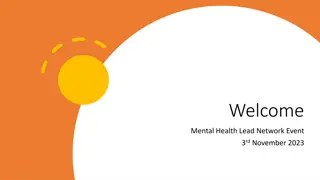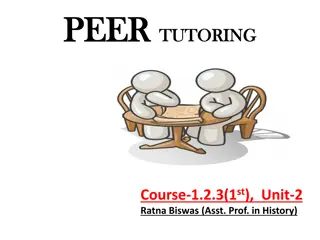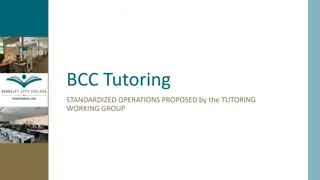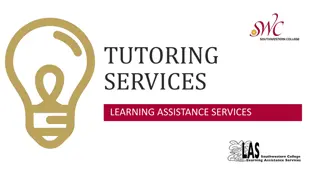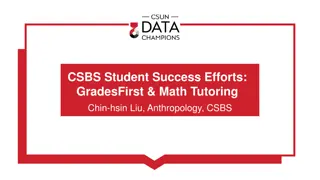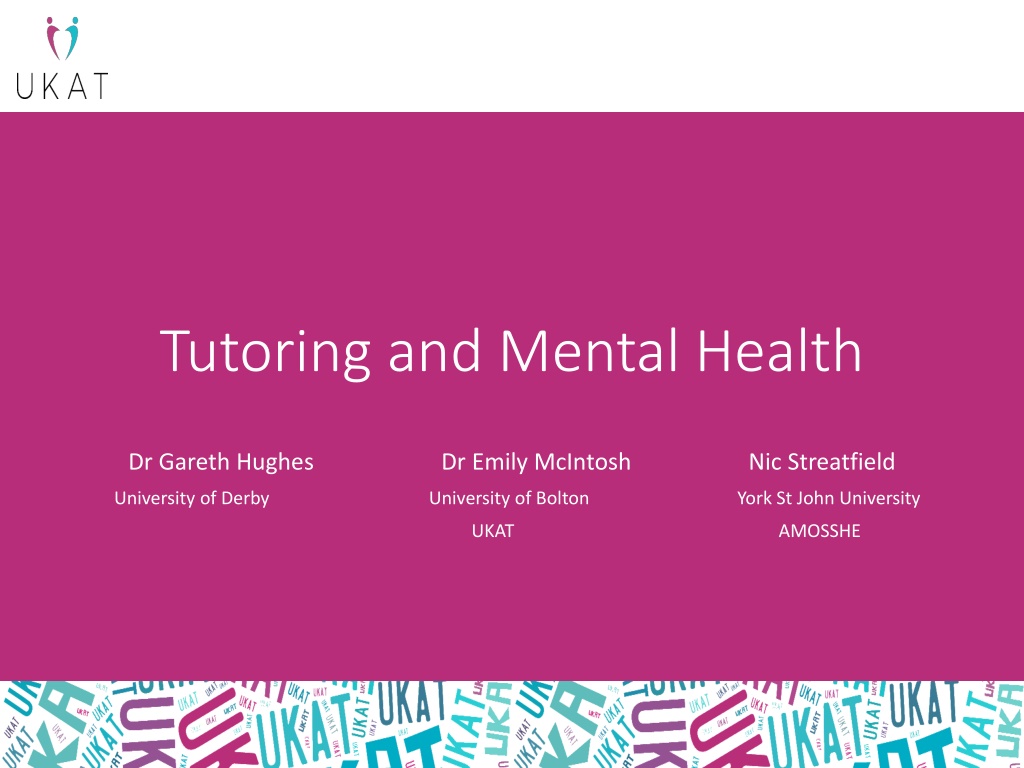
Understanding Student Mental Health in Higher Education Institutions
Explore the intersection of academics, tutoring, and student mental health in universities, focusing on research initiatives, support services, and the impact on both students and faculty members. Discover key themes, challenges, and strategies for promoting mental well-being in academic settings.
Download Presentation

Please find below an Image/Link to download the presentation.
The content on the website is provided AS IS for your information and personal use only. It may not be sold, licensed, or shared on other websites without obtaining consent from the author. Download presentation by click this link. If you encounter any issues during the download, it is possible that the publisher has removed the file from their server.
E N D
Presentation Transcript
Tutoring and Mental Health Dr Gareth Hughes Dr Emily McIntosh Nic Streatfield University of Derby University of Bolton York St John University UKAT AMOSSHE
Student Minds Student Minds empowers students and university staff to develop the skills, knowledge and confidence to look after their mental health, support others, and create change, so that all in Higher Education can thrive.
Underpinned by Research Innovating with impactful, sustainable & scalable programmes How we aim to work A collaborative approach, Working in partnership and playing a strategic role Led by both Students Lived Experience and Professionals
The research Qualitative research project designed to Improve understanding of the role academics are playing in relation to student wellbeing Increase our understanding of the student mental health issues academics are experiencing and the perceived impact on them and their work Identify whether or not academics feel prepared and supported to respond effectively and appropriately to students Increase our understanding of what aspects of this role are working well and what aspects are preventing students from receiving effective support
Modul e leader s Programme leaders First year teachin g only Senior tutors 54 academics Senior fellows Directors of Boards of Study Experienced lecturers
Public & Privat e North, South, Midlands & London Single campus and multi site College structure and centralised structure Universities Russell Group, post 92 & red brick Large, medium and small
Major Themes Increase in poor student mental wellbeing Role and boundaries Multiple ways student mental health problems present Signposting Academics and Student Services Impact on Academics Resources and Support What Might Help?
The role of the personal tutor Set and communicate boundaries at the beginning of your relationship and remain consistent this benefits you and the student, as they will know what to expect if they do disclose something Conversations between you and your students are considered private but not confidential you can and in some cases must discuss with Student Services Students may seek emotional support from you because they have a pre- existing relationship with you and you are easier to access if you become their source of support, you may also be a barrier to them accessing more effective interventions
Signposting To facilitate students to access support, academics must Be able to identify when a student is experiencing problems that would benefit from support Be aware of and able to identify services to students and explain how they can be accessed Be able to outline how and why a service could help a student and encourage enough hope to motivate the student to access support
Traditional relationship between academics and Student Services Clearly defined boundaries Support professionals Academics Creates gaps that students can fall into
Collaborative relationship Overlap of interests, practices and principles Support professionals Academics but still with clearly defined boundaries
Learning approaches and their connection to everything Deep learning Surface learning Focus on subject High achievement Good wellbeing More satisfied with teaching and learning Focus on grades Lower achievement Poor wellbeing (high anxiety) Less satisfied Focus on intrinsic motivation Focus on extrinsic motivation
Holistic approach to wellbeing Academic skills, effort and approach Social health
AMOSSHE/UNITE Student Resilience Toolkit
AMOSSHE/UNITE Student Resilience Toolkit Employed a researcher to gather together a Student Resilience Toolkit for the UK HE sector. Resilience is a preventative approach to student wellbeing as defined in the Exploring the positive case for resilience , McIntosh & Shaw 2017 Items for inclusion in the toolkit should primarily be sourced from the UK higher education sector, but may also include items from other comparable HE systems (e.g. Australia, US) and be of interest and use to professionals working in higher education, primarily student services professionals but also academic tutors, senior leaders etc Items may be case studies, research reports, intervention tools, learning materials or similar. Academic papers can be included where they have the potential to help professionals develop their practice in supporting student resilience. Thought pieces without any underpinning evidence base are out of scope.
Vision for the final product A modern web based resource that looks smart and professional and is easy to access on all devices A useful set of tools and resources that are in one place and grouped together sensibly with a good search function that can be continually updated as needed. A toolkit that AMOSSHE members and other stakeholders will rate highly and use regularly to compliment their work
AMOSSHE Insight Projects AMOSSHE Insight Projects In order to enhance the toolkit with member-led research, AMOSSHE is financially supporting a series of projects on the theme student resilience in an accommodation setting Student Community Makers Developing resilience using the Mind resilience programme Enhancing student resilience through the provision of themed group interventions Developing and increasing resilience within care leavers, in a student accommodation setting with the aim of increasing student retention
Concluding Comments Any questions?



